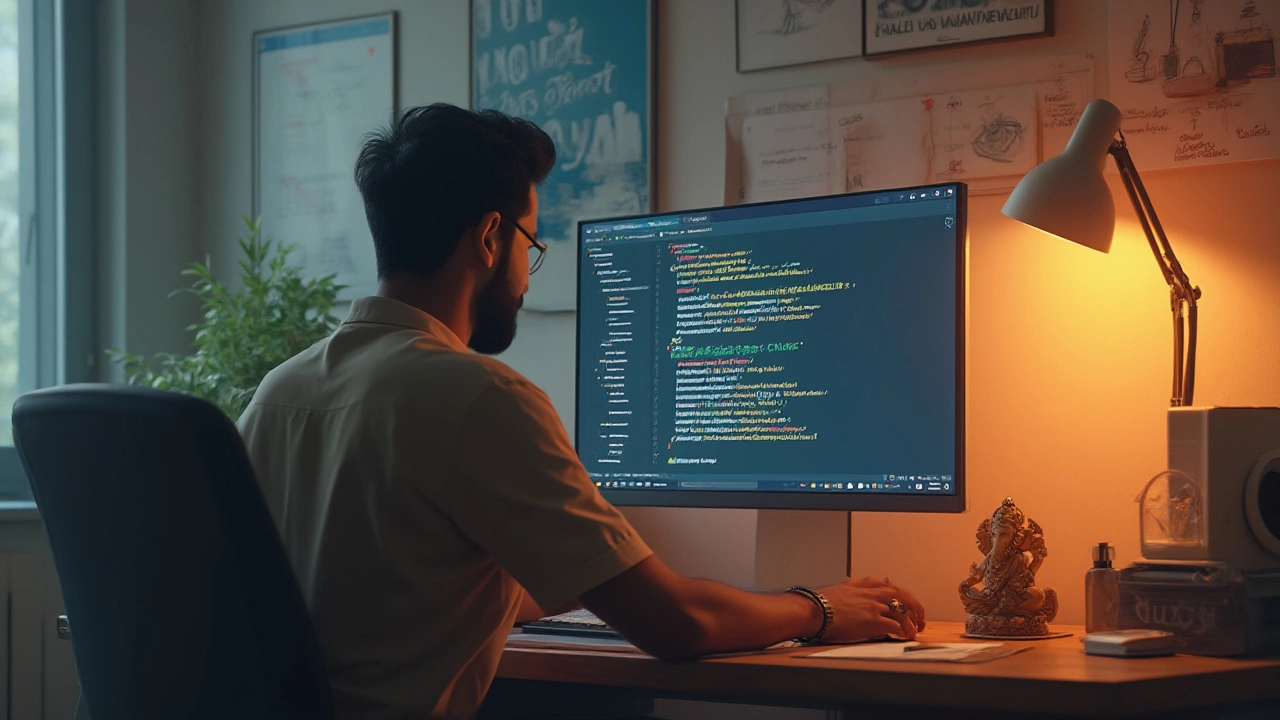Ever heard of a coffee shop barista turning into a software engineer, or a history major going all in on Python? You probably have, because people keep proving—sometimes against all odds—that you don’t need to be born a genius or have a computer science degree to make it as a programmer. Learning coding alone sounds intimidating, but with the internet overflowing with resources plus a hefty dose of motivation, it’s more in reach now than ever.
The Reality of Teaching Yourself to Code
Let’s not sugarcoat it: learning how to code by yourself isn’t easy, and anyone who says it is probably hasn’t actually tried it. But the beauty is, you don’t need permission to get started. You won’t need to wait to enroll in a university or pay thousands for a bootcamp to write your first line of code. There’s real power in simply opening up your laptop and deciding, right now, to try. In fact, in a 2023 Stack Overflow Developer Survey, 71% of professional developers reported learning at least some of their skills through online resources rather than formal education. That’s not just a fluke—it’s a trend.
This surge in self-taught coders is partly because everything you need exists for free or at low cost. YouTube is a treasure trove of tutorials. Stack Overflow pretty much functions like the programming world’s hive-mind, and sites like freeCodeCamp and The Odin Project line up structured lessons if you don’t know where to start. Even big names, from Elon Musk to Steve Wozniak, have said that problem-solving and curiosity beat fancy degrees in the long run.
Motivation is a giant factor. The tech world is littered with people who bought a hundred-dollar online course and gave up halfway through lesson three. So, what keeps successful self-taught programmers in Oxford, Mumbai, or anywhere, moving forward? It’s the simple thrill of making something work—a website, a game, an app—and seeing the screen respond to you. That spark is addictive.
Coding alone can get lonely, but it’s not solitary by necessity. Online forums, Discord servers, social media groups, and local meetups connect beginners and pros alike. Back in 2022, I joined a small Python group here in Oxford that changed everything. Just swapping tips and frustrations with others adds a dash of accountability. My wife Fiona would overhear me grumbling about code errors and gently remind me to take a break before smashing my keyboard, which honestly helped as much as any tutorial.
Some people fear that self-teaching won’t lead to "real" programming—a worry totally out of step with the job market. Recruiters on LinkedIn and at nearly all tech Londoners' events openly look for portfolio projects, not diplomas. If you build stuff and stick it online, you’ll stand out more than you might think. The freelance world is booming too: Upwork’s 2024 reports show record demand for web and mobile development, with many successful hires never having set foot in a formal computer science class.
Resources and Paths for Learning Coding on Your Own
Feeling stuck at the start is normal because the choices seem never-ending, and it’s tough to know which language, framework, or approach suits your actual goals. Here’s where carving a practical path makes the difference between dabbling and progress.
First off, decide on an end goal. Do you want to build websites, design mobile apps, analyze data, or something else entirely? If websites are your thing, HTML, CSS, and JavaScript form the big three for front-end work. For back-end, Python is beginner-friendly and mighty, while Node.js is a strong runner-up. If apps are your dream, Swift (for iOS) and Kotlin (for Android) are the reigning champs.
Structure matters—a lot. The easiest mistake is to watch random tutorials, end up lost, and quit just as formulas start getting interesting. You’re better off choosing a single structured program:
- The Odin Project: Focuses on web development, covering HTML to JavaScript servers.
- freeCodeCamp: Offers interactive lessons and is loved by millions for a reason.
- Codecademy: Great for hands-on lessons and beginner clarity.
- YouTube Channels: Traversy Media and Academind are go-tos for clear explanations and real-life projects.
- Harvard’s CS50: A legendary intro course, entirely free, and not dumbed down.
Mixing these sources helps, but don’t overwhelm yourself with six side projects at once. Build one thing at a time—maybe a personal website or a simple calculator app. Each project adds not just to your skills but also to a growing portfolio.
You’ll run into bugs. Lots of them. Google is your best friend (this rule never really changes; ask anyone). But also, there’s something special about Stack Overflow’s curated chaos. Don’t be afraid to ask questions—even the “stupid” ones. Every real coder has asked something embarrassingly basic at least once, usually more.
"Most programmers spend the first five years feeling like total imposters." — Quincy Larson, founder of freeCodeCamp
Plenty of free tools speed up learning. Visual Studio Code is a top-notch code editor with all the bells and whistles, and GitHub lets you version-control and share your work easily. Notion or Google Docs can keep track of your progress (and trust me, checking off skills is pure satisfaction).
Where do paid courses fit in? They do help for deeper dives or curated feedback, but don’t get caught believing the expensive stuff is always better. Some of the best coders I know built their foundations on nothing but free tutorials, grit, and curiosity. Once you know your learning style and gaps, then consider shelling out for something with personalized feedback or industry certifications.

Common Challenges and How to Push Through
If you expect the road to developer stardom or career change to be perfectly paved—you might be in for a shock. Self-taught coders hit rough patches early and often, especially with concepts like recursion, object-oriented programming, and asynchronous code. But you’re not failing if you find these ideas tough. It just means your brain is stretching in new ways.
Motivation will come and go. There’ll be days you score a small win—your code works, the website looks good. But sometimes you feel stuck. Try to keep perspective: even the pros at Google or Microsoft still stare at errors and wonder if they’ve forgotten everything. Regular practice is key. I started by coding just 30 minutes a day, often after work or while Fiona cooked dinner (I did the dishes). Consistency trumps sprinting then burning out.
Another challenge is learning to debug effectively. Beginners often panic when faced with mysterious error messages. A better approach is to slow down, break the problem into parts, and read the error out loud. I’ve fixed code after mumbling “unexpected token” to myself for an hour. And don’t forget the old advice: step away for ten minutes. Solutions love to appear when you’re not forcing them.
Distraction is a saboteur. Turn off notifications and keep code windows tidy. Pomodoro timers help—focus hard for 25 minutes, then take a real break. Fiona would drag me out for a walk in the park, which nearly always helped me untangle whatever mental mess I’d made. Stay curious and remember coding is creative, not just mechanical.
Finding the right pace is hard. Binge-watching tutorials gives the illusion of progress, but real improvement comes from writing real code and breaking things yourself. Don’t be afraid to throw away bad projects or revisit the basics. Start a coding blog or tweet your learning—it builds confidence and sometimes attracts unexpected job offers.
The “imposter syndrome” gremlin creeps up a lot. Most self-taught coders feel like frauds at least once a week. Here’s a secret: nobody knows everything. Even senior devs Google stuff all the time. The trick is to celebrate small wins and compare yourself only to your past self—not the seemingly perfect programmers on YouTube.
External feedback is gold. Get friends or other learners to review your code on GitHub. The embarrassment of bad code is short-lived, but the lessons stick forever. Keep all your attempts, even the failed ones, and revisit them every few months—you’ll spot your own growth and weaknesses far better than anyone else’s checklist.
What’s Next After You’ve Taught Yourself Coding?
Okay, so you’ve wrestled with tutorials, solved some LeetCode problems, maybe even shipped your first web app. Now what? This is the crossroads where many new coders trip up—not knowing how to move from learning to actually landing a gig or launching a bigger project.
Your portfolio is your ticket. Gather your best projects—doesn’t matter if they’re small, as long as they solve a real problem or show your understanding. Host them on GitHub and maybe set up a website (it can double as a learning project). Employers and clients want to see proof you can actually build and finish things.
Get involved with open-source projects. It sounds intimidating, but there are beginner-friendly issues tagged with "good first issue" everywhere, especially in the web development world. Contributing even a tiny fix shows teamwork, communication, and a willingness to learn. Check out Mozilla, freeCodeCamp, and public repositories for a start.
Networking does matter. You can actually land jobs through Twitter connections, Discord communities, or local coding meetups. Don’t just cold-apply to jobs; try to build authentic connections. Be honest about your journey and what you’re still trying to learn. Employers value humility and hunger.
Certifications are nice but not required. If you like structure, Google’s IT Support or Coursera’s Python courses give solid credentials. Still, actual code will almost always win out.
| Learning Path | Typical Duration | Cost Range | Real-World Job Success |
|---|---|---|---|
| Self-taught (free online courses) | 6-24 months (varies) | £0 - £100 | High (if portfolio is strong) |
| Bootcamp (in-person/online) | 3-12 months | £5,000 - £12,000 | High (structured, fast-track) |
| Traditional Computer Science Degree | 3-4 years | £27,000+ | Very high (more theoretical depth) |
The world of tech changes fast. Stay updated by following leaders on X (like Wes Bos or Angie Jones), subscribing to newsletters, and trying out new languages or tools every now and then. The best developers never stop tinkering.
All this to say—learning to code alone is completely possible, and might be the most practical, affordable skill move in 2025. Don’t let doubt keep you from plugging away at it. If you ever need evidence it works, just look at the people quietly building careers from kitchen tables, spare rooms, and co-working spaces all over the world. Not bad for something you can start today, from home, without waiting for anyone’s permission.
